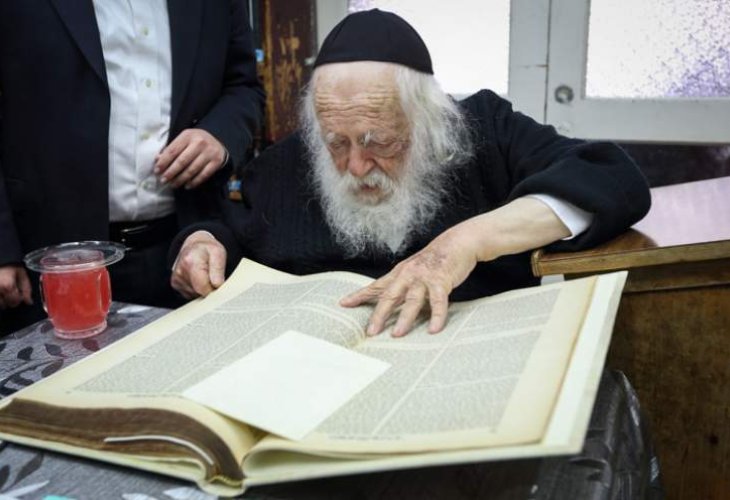Personal Stories
The Power of a Single Blessing
Can a person in pain still live a life of meaning? A heartfelt Torah insight on blessings and suffering
 Rabbi Chaim Kanievsky (Photo: Flash 90)
Rabbi Chaim Kanievsky (Photo: Flash 90)1. The Path to Receiving Abundant Blessing
The Zohar, in Parshat Vayechi, teaches something powerful: "Whoever blesses Hashem is blessed, and whoever does not bless misses out on blessing." It continues: “For those who honor Me, I will honor”—and in addition, the person lives a long life. The book Mitzvot Zmaniyot adds, “Know, my child, that the greatest mitzvah (commandment) and the highest form of serving Hashem is making blessings. Every Jew must thank Hashem for everything with the appropriate blessing.”
2. Angels Answer ‘Amen’
The holy book Kav HaYashar (chapter 96) tells us that when someone makes a blessing on a mitzvah, angels connected to that mitzvah gather around, listen to the blessing, and respond with “Amen.” Imagine the beauty and holiness in that moment.
3. One Who Blesses Is as if They Fulfilled All Mitzvot
A midrash (rabbinic teaching) explains the verse “Taste and see that Hashem is good” this way: Hashem says, “If you eat from the fruits of the land or a tree—bless them.” The commentary Zayit Ra’anan adds, “If you bless everything, it is considered as if you fulfilled all the mitzvot.” (Yalkut Shimoni, Tehillim 34)
4. Through Blessing, One Eats from Their Own
Another midrash says: When you eat and say, “Blessed are You, Hashem,” you’re not taking something that isn’t yours. Instead, it’s as if you’re eating from your own. And it’s also as if you fulfilled the entire Torah, as it says, “You shall eat and be satisfied and bless,” which is right next to the verse “all the commandment.” Our forefathers did the same—those whom Hashem loved for this reason. (Yalkut Shimoni, Tehillim 16)
5. A Jewish Child’s Blessing Uplifts the World
Rabbi Yitzchak Zev Soloveitchik once sent two students to start a yeshiva (Jewish school) in Or Yehuda, for children from difficult backgrounds. After much effort, the staff felt discouraged—they didn’t see the fruits of their work. They asked the Rav whether it was worth continuing. He answered: “It’s worth it if you succeed in getting even one Jewish child to say a Shehakol blessing just once! If you understood the greatness of even one sincere blessing, you wouldn’t even consider closing the yeshiva.” He encouraged them to study the book Nefesh HaChaim to see how powerful a blessing is in all the spiritual worlds.
6. One Blessing a Day is Worth a Life of Pain
In Derech Sicha, we hear a deeply moving story: Someone asked Rabbi Chaim Kanievsky z”l about a woman who was completely bedridden, suffering greatly, unable to move. Should they pray for her to live longer—or perhaps to have peace and an end to her suffering? The questioner shared a story about the Maharil Diskin, who once visited a widow in a similar situation. She couldn’t move, needed full care, yet said to him: “Rabbi, bless me with long life.” Surprised, those around asked why she would want to live like this. She answered: “Once a day, a woman comes to clean me, and afterward, I can say one blessing in purity. It’s worth suffering all day just to say that one blessing.” Rabbi Kanievsky agreed completely. “She was right,” he said. “We should pray that the sick person will be healthy and live a long life.”
7. Blessings Are Like a Sweet Offering to Hashem
Blessings and prayers are at the heart of our relationship with Hashem. The Sages taught that our daily prayers were established to reflect the korbanot (offerings) once brought in the Temple. Just as those offerings were pleasing to Hashem, so are our blessings and prayers—a spiritual offering from our hearts.
8. The Bread Would Dance with Joy
Rabbi Baruch Ber Leibowitz once told his students about something a Jew from Slutsk said that deeply moved him. The man pointed to a loaf of bread and said, “If bread had a mind and could speak, it would dance with joy! Because it knows that the great and awesome Name of Hashem will be blessed over it.” What a beautiful thought: that the simplest act—eating a piece of bread—can be filled with such holiness.
9. How to Bless with Intention: Tips from Great Rabbis
In the book Notrei Beracha, three great rabbis shared their advice on how to make blessings with real focus (kavanah).
Rabbi Shmuel Halevi Wosner said: “Yes, it’s hard work—but read each blessing from a written text. That helps.”
Rabbi Chaim Kanievsky said: “Think about the words of the blessing. It’s not hard if you practice! Focus for 30 days straight, and it’ll become natural.”
Rabbi Yehuda Tzadka suggested dividing the blessing into three parts: (1) Blessed are You, Hashem; (2) our God, King of the universe; (3) and then the rest.
Rabbi Yisrael Salanter had his own way: He made sure to always concentrate on the first two blessings in Birkat HaMazon (Grace After Meals).
10. The Gateway to Divine Inspiration
The late Rabbi Chaim Vital wrote that being careful and intentional with blessings is the main way to reach ruach hakodesh—divine inspiration. He explained: when someone blesses with real focus, they remove spiritual impurities from their food and purify themselves as well. This prepares their soul to receive holiness. “I was strongly warned about this,” he wrote, “and so a person should always prepare his heart to bless with deep focus, word by word—with great joy.”

